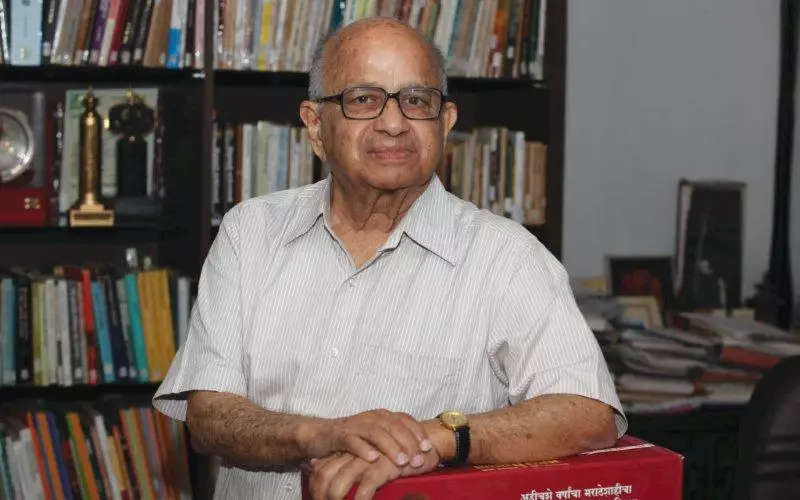Ramdas Bhatkal has always encouraged the self-esteem of not only writers – young and veterans – alike but also of the artists, printers, and junior assistants, all who contribute to the making of a book. He scales professional heights only because of his nature, which prompts him to respect others’ ideas.
He has set an example for the young generation by his amiable behaviour. ‘‘Never hesitate to knock on the door if you are stuck at something. Disturb me even when I am hosting a party’’ – I clearly remember him telling me this 23 years ago, when I joined Popular Prakashan. It was simply incredible to see a CEO encourage a young cub in this way. As I started working with him, the feeling of great awe that I felt then gradually receded. His simplicity of style and all-inclusive nature accounted for the way that he guided us then.
Not only the editorial policy but also the entire ambience at Popular Prakashan is different. The reason that one can work freely and unwaveringly at Popular Prakashan is entirely due to the friendly and understanding nature of Ramdas Bhatkal. Self confidence, a positive attitude towards life, an outgoing nature and never-ceasing curiosity not only helped him professionally, but his inborn editorial instincts have helped Popular Prakashan grow in diverse directions in the last 60 years. At the age of 17 it was quite a foresight to have set up a Marathi publishing house with a definite purpose in mind. The seeds of Bhatkal’s successful editorial career are evident from his unfaltering confidence at the age when most people are either generally confused about their lives or careers, or they daydream. Bhatkal was heir to a very successful bookselling business, yet he was more interested in the new experiments by struggling writers rather than an easily available range of established authors.
Needless to say that not only new writers but also any writer whose contributions brought any significant novelty to Marathi literature was welcome in Popular Prakashan. This accounted for the inclusion of not only the then new short-story writers and poets like Gangadhar Gadgil, Arvind Gokhale, and Mangesh Padgaonkar whose works were the first Marathi publications by Popular Prakashan, but also of the writers of the earlier generation, like Kusumagraj, Mama Warerkar, Prabhakar Padhye, Vishram and Maltibai Bedekar. Bhatkal could achieve this only because he understood that good writing does not depend on the age and generation of the writer.
As an editor Bhatkal was especially skilful at judging the merit of a writer, rather than evaluating a specific book. He never considered books separately while accepting a writer’s manuscript. Moreover, acceptance of a manuscript was never prompted by the commercial speculations, which continues even today. A manuscript is accepted here because of the sparkling potential of a writer in it. Once the book of a writer is accepted, then almost all his writings, including the weak ones too, are published by Popular Prakashan, in accordance with the 60-year-old tradition set up by Bhatkal. This is the reason why the professional relationship between the publishers and the writers in Popular Prakashan has grown into a more intimate one. They are so intense that many a times writers like Gangadhar Gadgil and Vasant Kanetkar have taken significant career choices according to Bhatkal’s advice. Another reason for this ever-growing relationship was that Bhatkal has never imposed his ideas on the writers. An excellent editor discusses disputed points in a writer’s work after careful reading, and he may advise the writer, but he will let the writer decide on any modifications.
Ramdas Bhatkal has always given this liberty to writers. In a career spanning in six decades there have been many instances of disagreements and disputes. But each time, he has respected the writer’s say. I remember one instance. There was some objectionable matter regarding national heroes in a novel by a literary heavy weight. I had suggested to Bhatkal that the part be omitted, and his reply was very important: “ You ask him. If he makes changes that is good. But if he doesn’t that leaves us two options. Either print it as it is or politely reject it. But the writer should not be pressurized to change it.” Then, after a lot of discussions the writer made the required changes and we published the book. His personal opinions, ideology, and taste have never interfered with his choice of books.
He has been able to maintain a very cordial relationship with a variety of people belonging to different fields, with different ideologies. Writers could talk to him freely about anything because of his all-comprehensive perspective. It is Ramdas Bhatkal’s winsome persona that has let all altercations end in happy discussions and gradually into the publication of a great book. His nature has helped him professionally in terms of the variety it has brought to the list of Popular Prakashan’s publications – stories, poetry, novels, plays and criticism also show diversity. He didn’t ignore old story writers such as Go Ga Limaye and Kamalabai Tilak while publishing new writers such as Gangadhar Gadgil and Arvind Gokhale. He has given equal importance to both literary experimenters like Bhalachandra Nemade and Shyam Manohar, and traditionalists like Jyotsna Devadhar, Uddhav Shelke Nirmala Deshpande, who contributed significant works.
Popular Prakashan has contributed most significantly in the area of Marathi drama and poetry – both equally neglected by Marathi publishers. The reason is that Bhatkal understood the importance of these literary genres. Popular launched its poetry list with Padgaonkar’s Gypsy. The popularity of Gypsy gave Bhatkal the strength and confidence to publish Marathi poetry, and in the next few years almost all major Marathi poets were published by Popular. This was the result of Bhatkal’s editorial vision. It was only because of Ramdas Bhatkal that these important, yet totally different, poets in terms of subject and style remained under one roof, of Popular’s.
What happened with poetry, followed with drama too. Publishing the text of a play was not considered important by Marathi publishers or by playwrights. A play was meant to be for theatre and the playwright and director would write it down as required. Sometimes it was published, but it was Ramdas Bhatkal who established the practice of publishing Marathi plays because he was aware of their literary value. Once resolved to publish a play, he adopted the policy to publish the “author’s text” as in the case of any other book. He gave complete freedom to the playwrights to either include or exclude changes that may have been made to the original text of the play according to theatrical conveniences.
We can spot his liberal editorial policy in his editing of plays. He grasped the worth of the text regardless of the play’s category – experimental, commercial or popular. He published Mama Warerkar’s Bhoomikanya Seeta and Mo Ga Ranganekar’s Kulavadhu. He published Shirvadkar’s never-staged play called Kaikeyi quite as dearly as his most celebrated Natasmrat. He decided to publish Vishram Bedekar’s Tilak Ani Agarkar without even considering its commercial success prior to the date of opening. Popular’s list of proud playwrights includes today people like Vasant Kanetkar, Vijay Tendulkar, Shyam Manohar, Vi Va Shirvadkar, Ajit Dalvi, Prashant Dalvi, Ashok Patole, and the newcomers like Manaswini Lata Ravindra, and Dharmakirti Sumanta etc.
Like fiction, in criticism too diverse people of different sensibilities, like Wa La Kulkarni, K Kshirsagar, D K Bedekar, Da Ga Godse, Gangadhar Gadgil, Da Bhi Kulkarni have been published. Bhatkal firmly supports the writer in all respects. He has a mighty heart to face the music for a writer’s work as well as win accolades for the same. He hasn’t hesitated to seek legal help for the writers whose books he believed to be exceptional. It was he who took pains to spread the greatness of Bhau Padhye’s Vasunaka.
Bhatkal always pays minute attention from the cover page to the blurb at the back of a book, to make the book look attractive. He carefully considers who should design the cover, and then he discusses it, just as he would do with the writer. Bhatkal has always preferred cover designs that are attuned to the subject of the books than the commercially more attractive designs. Popular’s covers were always novel because Bhatkal has believed in the excellence of the cover design, which came after the artist read the manuscript. These covers set new benchmarks for Marathi publications. He has involved the writers in all these processes. Many times, he has worked out a golden mean in the extremes of opinions of the writers and cover artists, but he has skillfully steered clear of it.
He has equally benefited from this team-leading skills. Although he took all the editorial decisions as the first two decades of Popular’s growth, yet he never felt shy to discuss with his elder brother and literary colleagues and mates. He always looked for new writers who showed great potential and talent. For this, he made use of his talent hunting skills. In the initial years he was immensely guided by Wa La Kulkarni. It was due to him that Popular bagged a great poet like Na Dho Mahanor. Later, he tried to know about new writers from the discussions he held with friends like Mahanor, Shirish Pai, Keshav Meshram, and Chandrakant Patil. He found two of the most important playwrights of this generation like Manaswini Lata Ravindra and Dharmakirti Sumant through such discussions. Manaswini graduated from Lalit Kala Kendra and started staging plays like Cigarettes and Alvida under Lalit Mumbai. Vijay Tendulkar knew Bhatkal’s and Popular’s passion for theatre hence he suggested Manaswini’s name to him. Similarly Satish Alekar suggested Dharmakirti’s name. A postgraduate student of political science in the University of Pune, Dharmakirti has received many awards for playwriting. Paani, a play he penned at the age of 21 shows his matured personality. Geli Ekwees Varshe is a play on the mixed consequences of globalisation on the young generation. This play has received international recognition in festivals in 2010. Bhatkal’s habit of chatting has thus always helped him a lot.
The most important characteristic of Ramdas Bhatkal as an editor is his ability to encourage his juniors to take decisions, and his magnanimity in showing confidence in them. It is a very rare tendency to find the boss respecting the decisions taken by juniors, guiding them if they are mistaken, and helping them with confidence.
Popular Prakashan has been in the business of books for over 85 years. The company has published over 900 titles in Marathi and 1,000 titles in English, with bestselling authors. Concentrating mainly on fiction, drama, literary criticism and poetry, in the field of Marathi publishing, Popular has pioneered the rise of a new generation of award winning writers. The company has also pioneered publications in medicine and social sciences.
Asmita Mohite is an editor with Popular Prakashan, Mumbai.
Originally written in Marathi, this profile was translated into English for PrintWeek India.














 See All
See All